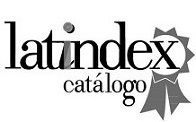Sobre a Revista
Enfoque e alcance
A revista Cuadernos de Literatura. Revista de Estudios Lingüísticos y Literarios é uma publicação digital de colaborações acadêmicas originais e inéditas referentes às áreas de linguística e literatura, realizada pelo Instituto de Letras "Alfredo Veiravé" da Faculdade de Humanidades da Universidade Nacional do Nordeste, Argentina. A mesma, promove abordagens interdisciplinares para estabelecer diálogos e conexões no campo das humanidades. Também tenta contribuir e estimular novas pesquisas e divulgar estudos sobre diferentes espaços acadêmicos e profissionais das letras. Cadernos, apresenta as seguintes seções: editorial, artigos, ensaios e resenhas de livros em espanhol, português e inglês.
Renovamos os propósitos apresentados na primeira edição, em 1982, pela Professora Hilda Torres Varela quem indicava: "Contaremos com a colaboração de nossos professores e graduados, mas aspiramos a que seja um órgão interdepartamental e interuniversitário. Suas páginas serão enriquecidas com a contribuição de outros escritores e pesquisadores do meio, alheio à Universidade. O propósito que os Cadernos de Literatura persegue é, modesto e ambicioso: refletir o trabalho do Instituto - retomar os vínculos, através de espaços e distâncias, com aqueles que compartilham o interesse comum no profundo e renovado conhecimento das letras".
Políticas da Seção
Palavras Preliminares
Prólogo
Editorial
Artigos
Artigos breves
Ensaios
Resenhas
Artigos livres
Processo de avaliação por pares
O Comitê Editorial realiza uma primeira avaliação dos manuscritos enviados para as seções de Artigos, Artigos Breves e Ensaios, considerando as diretrizes vigentes para autores e autoras e a política editorial. Seguidamente, os trabalhos são submetidos a uma avaliação realizada por dois especialistas externos, selecionados/as conforme a sua relação com a temática dos trabalhos. Todo esse processo é anônimo e é realizado sob a modalidade de "peer review" em duplo-cego, o que implica que tanto as/os autores/as quanto os/as avaliadoras/es desconhecem a identidade uns dos outros. Para manter o anonimato de todo o processo, o nome do/a autor/a não deve aparecer no texto. O relatório será duplo e se as avaliações forem opostas, um terceiro relatório será usado para desempate.
O comitê coordenará com o referato o prazo para a avaliação, que não deverá ultrapassar 45 dias no máximo. Como resultado da avaliação, o artigo/ensaio pode ser declarado: Publicável, Publicável com modificações menores; Publicável com modificações significativas; ou Não publicável. De acordo com isso, o processo pode envolver até duas etapas de revisão antes de confirmar a aceitação ou rejeição do manuscrito. Todo o processo poderá demorar até 120 dias. Se o comitê editorial e de avalaidores notar que os autores/as não seguem nem respondem às observações dos/as avaliadores/as nas diferentes instâncias de avaliação, os trabalhos não serão publicados.
O Comitê Editorial e o Comitê de Referato selecionam os artigos conforme os seguintes critérios: originalidade e interesse sobre o tema ou problema apresentado; relevância em relação às pesquisas atuais na área; rigor na argumentação e análise; precisão no uso de conceitos e metodologia; discussão das implicações e aspectos teóricos do problema estudado; utilização de bibliografia atualizada; correção linguística, organização e apresentação formal do texto; clareza e concisão expositiva; caráter inédito e cumprimento das normas para autores/as.
Em relação às Resenhas serão avaliadas pelos/as integrantes do Comitê Editorial, que considerarão o estabelecido a respeito na normativa para autores/as.
Frequência da publicação
Cuadernos de Literatura. Revista de Estudios Lingüísticos y Literarios mantém sua convocatória aberta para encaminhar produções de forma permanente durante todo o ano e publica três ediçoes anuais nos meses de maio, setembro e dezembro.
Política de acesso aberto
A revista é publicada sob a licença Creative Commons, do tipo Atribuição Não Comercial. Sendo uma revista de acesso aberto, a reprodução, cópia, leitura ou impressão dos trabalhos não tem custo algum nem exige processo de identificação prévia.
A publicação por parte de terceiros será autorizada sempre que seja devidamente reconhecida e explicitamente mencionada como o local de publicação do original.

Esta obra está sob uma licença Creative Commons, do tipo Atribuição Não Comercial 2.5 Argentina
Política para a detecção de plágio
Todos os artigos enviados para esta publicação serão supervisionados por meio de uma busca online e através de ferramentas de detecção de plágio (PaperRater, Plagiarisma e/ou Grammarly’s plagiarism checker).
Caso seja comprovado plágio ou autoplágio, os envolvidos serão notificados e, caso a situação não seja resolvida, o manuscrito será rejeitado para publicação nesta revista.
https://www.paperrater.com/plagiarism_checker
Ética e Boas Práticas de Publicação
A revista adere às práticas sugeridas pelo COPE (Committee on Publication Ethics) no que diz respeito à integridade ética e moral das publicações científicas.
Arquivamento
Esta revista utiliza o sistema LOCKSS para criar um sistema de arquivamento distribuído entre bibliotecas colaboradoras, às quais permite criar arquivos permanentes da revista com fins de conservação e restauração.
Política de Preservação Digital
O Portal de Publicações Periódicas Científicas REVISTAS UNNE implementa um sistema de preservação digital a partir dos mecanismos de proteção de dados digitais fornecidos pela Universidade Nacional do Nordeste (UNNE), que permite o acesso contínuo e inalterável dos conteúdos publicados.
A área de TIC da UNNE é responsável pela infraestrutura informática da Instituição e, juntamente com a Biblioteca Central da Universidade, estabelece e coordena os procedimentos internos para a proteção eletrônica dos conteúdos do Portal de Revistas, tanto dos objetos digitais quanto dos dados e metadados associados a eles.
Dados de fundamentação das pesquisas
Àqueles que enviem artigos científicos para a CLRELyL deverão garantir a disponibilidade e preservação dos dados utilizados, conforme a Lei Nº 26.899 de Repositórios Digitais. Caso o trabalho seja aceito, será solicitada a inclusão dos dados gerados em algum dos repositórios de dados de pesquisa (como SciELO Data) antes de sua publicação, devendo ser incluída no artigo a citação completa dos dados depositados. Essa citação deve ser inserida na seção "Referências bibliográficas" do artigo. Ao citar o conjunto de dados, será reconhecida a autoria correspondente, ao mesmo tempo que se esclarece sua localização, validação e reutilização; essa prática também facilita a métrica e o impacto dos dados e favorece a transparência da pesquisa científica. Cada conjunto de dados e subconjunto de dados deve ser citado de forma independente, com seu próprio DOI ou identificador similar.
Caso não seja possível ou viável que os dados estejam disponíveis de forma aberta (por problemas de confidencialidade ou sensibilidade, por exemplo), deverão ser compartilhados por meio de um repositório de acesso controlado.
Aviso de direitos autorais
O envio de trabalhos para Cuadernos de Literatura. Revista de Estudios Lingüísticos y Literarios implica uma declaração de originalidade da produção e a cessão dos direitos de divulgação. Os autores mantêm, no entanto, os direitos de propriedade intelectual e responsabilidade ética, bem como a possibilidade de divulgar suas produções pelos meios que considerem. A cessão de direitos implica também a autorização por parte dos autores para que o trabalho seja depositado no repositório institucional e/ou divulgado através das bases de dados que o editor considerar adequadas para sua indexação, com o objetivo de / visando aumentar a visibilidade da publicação e dos seus autores.
Declaração de autoria
Quando o artigo enviado à CLRELyL tiver mais de um autor ou tenha requerido a participação de outros colaboradores, o artigo deverá incluir, ao final, uma declaração dos papéis de autoria e participação. A taxonomia de redes de colaboração acadêmica (CRediT) busca proporcionar crédito a todos os papéis envolvidos no processo de pesquisa, garantindo assim a visibilidade e o reconhecimento correspondentes na comunicação dos resultados. Para isso, essa taxonomia especifica diferentes papéis de colaboração (como: análise formal, conceptualização, escrita - revisão e edição, etc.), os quais podem ser consultados no seguinte link: https://hdlab.space/taxonomia.
Caso não existam papéis de colaboração além da escrita e os autores tenham compartilhado essa tarefa, poderá ser declarado: “Autorx1 e Autorx2 contribuíram conjuntamente para a escrita deste artigo”.
Identificadores persistentes
A revista faz uso de identificadores de objetos digitais (DOI) para seus artigos através da afiliação que a Universidade Nacional do Nordeste mantém com a PILA (Publishers International Linking Association, Inc.), através da qual é agenciado o serviço Crossref.
Encargos por gestão de artigos
A revista não possui custos ou taxas relacionados ao processamento dos artigos (Article Processing Charge [APC]) enviados pelos autores. Também não há cobrança pela submissão para revisão dos artigos.
Política sobre Discussões Posteriores à Publicação
A revista Cuadernos de Literatura: Revista de Estudios Lingüísticos y Literarios busca criar espaços que promovam diálogos e conexões na área das humanidades e, especialmente, entre profissionais da área de Letras. Nesse sentido, oferecemos as seguintes alternativas para incentivar discussões construtivas e colaborativas depois da publicação dos artigos:
- Redes sociais e comunidades online: por meio de suas contas oficiais, os CLRELyL promoverão discussões sobre os artigos publicados. Os autores e leitores são incentivados a compartilhar seus comentários e participar dos debates online. Essa prática permite que os pesquisadores respondam a perguntas, proporcionem esclarecimentos e enriqueçam o conteúdo do artigo com contribuições adicionais.
- Colaborações e projetos conjuntos: a revista Cuadernos de Literatura incentiva seus autores a dialogar e colaborar com outros pesquisadores interessados nos temas abordados em seus artigos. Esses intercâmbios podem resultar em projetos de pesquisa conjuntos, apresentações em conferências ou publicações futuras, entre outras formas de colaboração acadêmica.
Política sobre pré-print
Os Cuadernos de Literatura aceitarão a publicação de pré-print quando o(a) autor(a) seja um(a) pesquisador(a) reconhecido(a) na área e possua publicações anteriores relacionadas ao tema do artigo.
A publicação será aprovada pelo Comitê acadêmico da revista e, enquanto mantiver seu status como pré-print, não contará com ORCID.




52.jpg)









